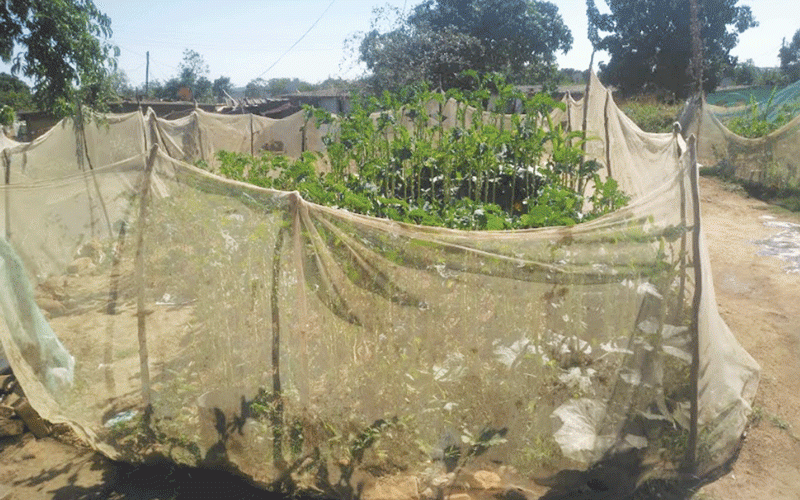
RURAMAI Madara (45) of Chikova Village, under Chief Kazangarare in Hurungwe, is literally feeling “secure” with the kind of fencing she “erected” at her homestead.
The outlying rural outpost is situated about 60km north of the farming town of Karoi in Mashonaland West province.
It is one of the few villages that have vegetables protected from destruction by mostly domestic animals like goats, cattle and even chickens, commonly referred to as road runners.
For a mother of five who also has three grandchildren, vegetables are bailing Madaka in her daily efforts to put food on the table.
A small four-bed garden is breathing life into her family during the unexpected rainfall patterns affecting Zimbabwe and southern Africa at large, due to climate change.
Her face beaming with confidence, Madaka has secured the garden with blue mosquito nets that she got as part of government’s thrust in malaria eradication.
“We are using the mosquito nets against goats that destroy garden,” Madaka said.
“We can’t afford to lose vegetables when we get free mosquito nets every year from government.”
- Malaria fight disrupted by COVID pandemic: WHO
- Malaria fight disrupted by COVID pandemic: WHO
- Co-operate to curb malaria, Mash West farmers urged
- Vaccines could be a game-changer in the fight against malaria in Africa
Keep Reading
Her situation is not peculiar as most villagers are now using mosquito nets as fowl runs or vegetable garden fences.
Some of the fish poachers use the nets during their errands in shallow waters, home ponds and farm dams.
Zimbabwe is one of southern Africa’s countries that has a high burden of malaria incidences.
Malaria is a serious public health issue in Zimbabwe and the country has a high burden of communicable diseases.
“I used several mosquito nets to fence around my fowl run and it worked,” said Martha Nyambuya (38) a farmer in the Fels area in Hwedza.
“We get these nets every year from government and non-governmental organisations (NGOs). We have plenty of them and we use them in gardens or as fishing nets.”
A tour around the farming areas of both Hwedza and Karoi areas denoted that most villagers have been abusing mosquito nets, turning them into perimeter fences.
As of this year, the country is still experiencing a high risk of malaria, particularly in the northern and eastern provinces.
The risk of malaria is high throughout the year, but is highest from November to June.
The northern and eastern provinces of Mashonaland Central, Mashonaland East and Manicaland account for about 80% of the annual malaria cases.
In the week ending April 21, 2024, about 1 929 malaria cases had been recorded, with 191 of those cases being children under five years old.
The four most affected provinces were Manicaland, Mashonaland East, Mashonaland Central and Masvingo.
Ironically, in recent years, Zimbabwe has been experiencing a surge in incidences of malaria, with some areas which were once malaria-free zones also reporting cases of the disease.
Community Working Group on Health executive director Itai Rusike admitted that there are worrying reports of some communities that are turning donated mosquito nets into fishing nets.
Others use them to fence their homes, gardens and fowl runs, in a development that hinders the fight against malaria.
“This clearly points to the urgent need to strengthen health promotion programmes in such communities as community participation and ownership of programmes requires adequate information,” Rusike said in a written statement.
He called for proactive action by the State as part of the right to healthcare.
“The government must invest more domestic funding in malaria prevention, diagnosis and treatment supported by strengthened community-driven awareness initiatives to stop the current malaria-related illnesses and deaths,” Rusike said.
“We call upon the government, the private sector and the civil society to pull resources together to ensure the implementation of innovative national strategies to accelerate progress against this old age disease.
“This must be done with the full community engagement to ensure understanding and complete buy-in from the areas where the programmes are being implemented,” he added.
He urged the government to continue implementing the World Health Organisation (WHO) recommended prevention strategies such as residual spraying of houses in high transmission areas and distribution of treated mosquito nets.
Mashonaland West health promotion officer George Kambondo said community health workers play a critical role in addressing issues affecting communities
“We must work together in curbing malaria control and prevention in Zimbabwe,” he said.
“Communities rely on community-based focal people on health matters.
“Let us raise awareness among CSOs on the key vulnerabilities, causes, signs and symptoms of malaria prevention strategies specific to their area of work and residence.
“CSOs’ awareness on the importance of malaria prevention and treatment is vital in the support and promotion of malaria prevention strategies.”
Kambondo further noted that there is justification on combined efforts to address challenges faced with malaria eradication.
“Therefore, we need to foster partnerships between the Health and Child Care ministry and CSOs to strengthen malaria elimination initiatives within the Zimbabwean social structure,” he said.
Kambondo said CSOs are the most respected institutions or agents linking communities to the wider population, potentially to greatly enhance public health work.
The Zimbabwe 2021–2025 National Malaria Control and Elimination Strategic Plan aim at reducing malaria incidence to 17 cases per 1 000 people and reducing malaria deaths by at least 90% by 2025.
According to the WHO, an estimated 236 million malaria cases, that is 95% of the global cases and 590 935 (97%) of global deaths, are from African member states in 2022.
The WHO African region is overwhelmed with the disease, where 94% and 95% of malaria case and deaths were recorded in 2022.
According to the WHO, rural populations within the African region living in situations of poverty and with less access to education are the worst affected.
“In view of the current trajectory, critical 2025 milestones of the WHO global malaria strategy for reductions in malaria cases and deaths will be missed,” a statement on the WHO website reads.










